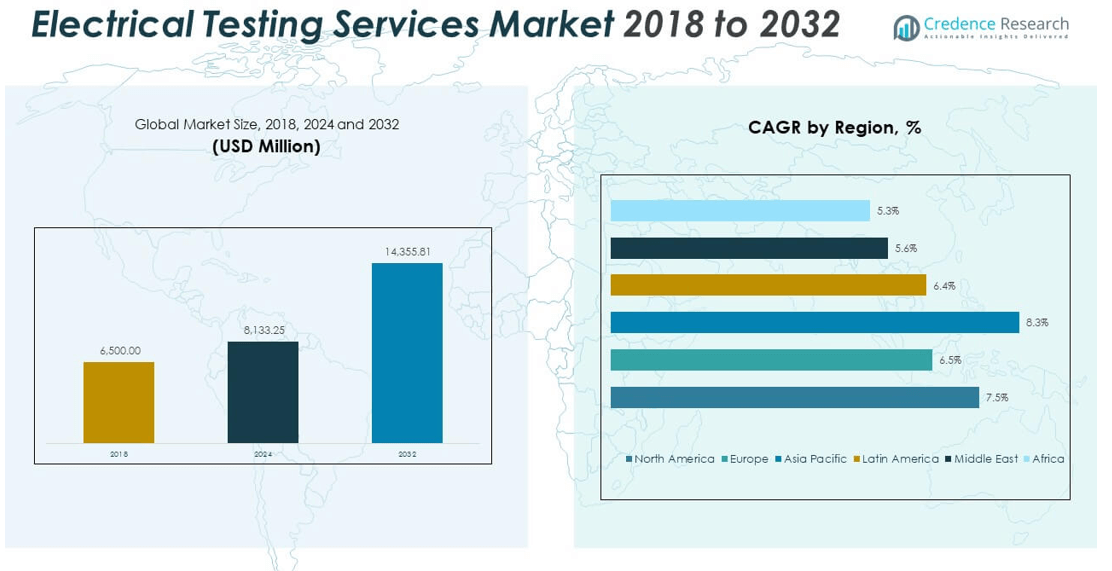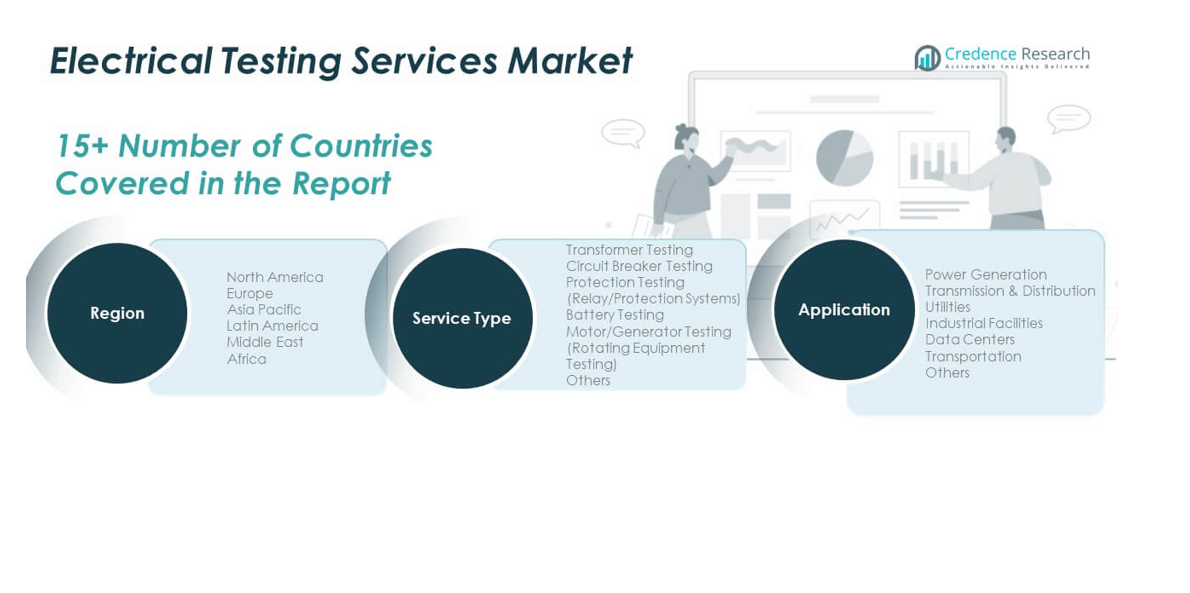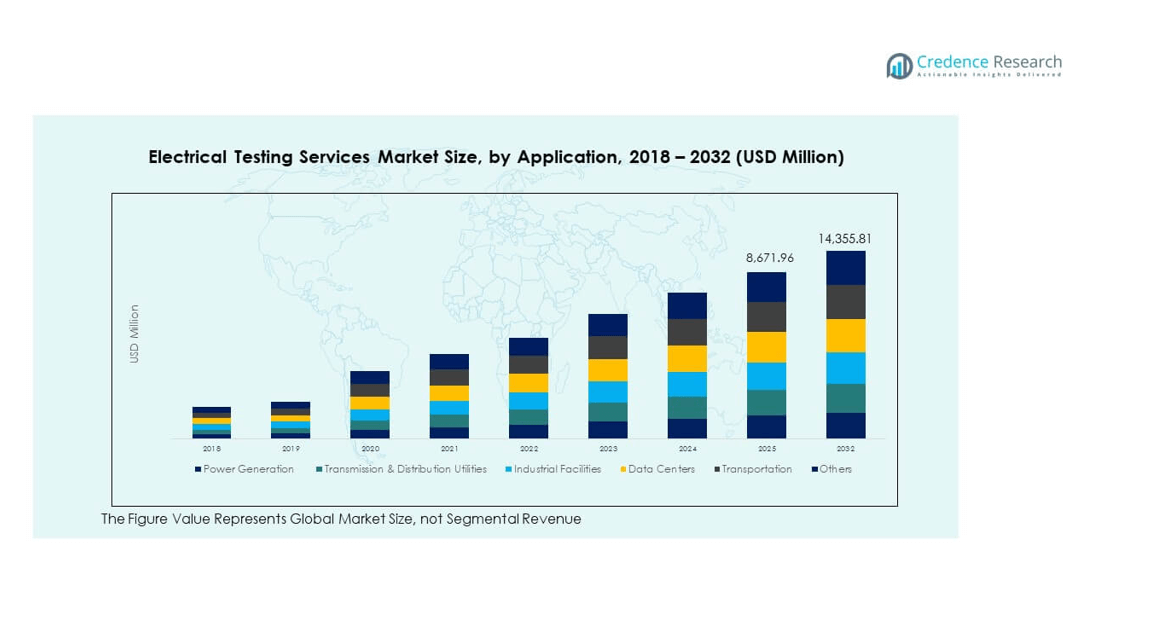CHAPTER NO. 1 : GENESIS OF THE MARKET
1.1 Market Prelude – Introduction & Scope
1.2 The Big Picture – Objectives & Vision
1.3 Strategic Edge – Unique Value Proposition
1.4 Stakeholder Compass – Key Beneficiaries
CHAPTER NO. 2 : EXECUTIVE LENS
2.1 Pulse of the Industry – Market Snapshot
2.2 Growth Arc – Revenue Projections (USD Million)
2.3. Premium Insights – Based on Primary Interviews
CHAPTER NO. 3 : ELECTRICAL TESTING SERVICES MARKET FORCES & INDUSTRY PULSE
3.1 Foundations of Change – Market Overview
3.2 Catalysts of Expansion – Key Market Drivers
3.2.1 Momentum Boosters – Growth Triggers
3.2.2 Innovation Fuel – Disruptive Technologies
3.3 Headwinds & Crosswinds – Market Restraints
3.3.1 Regulatory Tides – Compliance Challenges
3.3.2 Economic Frictions – Inflationary Pressures
3.4 Untapped Horizons – Growth Potential & Opportunities
3.5 Strategic Navigation – Industry Frameworks
3.5.1 Market Equilibrium – Porter’s Five Forces
3.5.2 Ecosystem Dynamics – Value Chain Analysis
3.5.3 Macro Forces – PESTEL Breakdown
3.6 Price Trend Analysis
3.6.1 Regional Price Trend
3.6.2 Price Trend by product
CHAPTER NO. 4 : KEY INVESTMENT EPICENTER
4.1 Regional Goldmines – High-Growth Geographies
4.2 Product Frontiers – Lucrative Product Categories
4.3 Application Sweet Spots – Emerging Demand Segments
CHAPTER NO. 5: REVENUE TRAJECTORY & WEALTH MAPPING
5.1 Momentum Metrics – Forecast & Growth Curves
5.2 Regional Revenue Footprint – Market Share Insights
5.3 Segmental Wealth Flow – Service Type & Application Revenue
CHAPTER NO. 6 : TRADE & COMMERCE ANALYSIS
6.1. Import Analysis by Region
6.1.1. Global Electrical Testing Services Market Import Revenue By Region
6.2. Export Analysis by Region
6.2.1. Global Electrical Testing Services Market Export Revenue By Region
CHAPTER NO. 7 : COMPETITION ANALYSIS
7.1. Company Market Share Analysis
7.1.1. Global Electrical Testing Services Market: Company Market Share
7.2. Global Electrical Testing Services Market Company Revenue Market Share
7.3. Strategic Developments
7.3.1. Acquisitions & Mergers
7.3.2. New Product Launch
7.3.3. Regional Expansion
7.4. Competitive Dashboard
7.5. Company Assessment Metrics, 2024
CHAPTER NO. 8 : ELECTRICAL TESTING SERVICES MARKET – BY TYPE SEGMENT ANALYSIS
8.1. Electrical Testing Services Market Overview by Service Type Segment
8.1.1. Electrical Testing Services Market Revenue Share By Service Type
8.1.2. Electrical Testing Services Market Revenue Share By Service Type
8.2. Transformer Testing
8.3. Circuit Breaker Testing
8.4. Protection Testing (Relay/Protection Systems)
8.5. Battery Testing
8.6. Motor/Generator Testing (Rotating Equipment Testing)
8.7. Others
CHAPTER NO. 9 : ELECTRICAL TESTING SERVICES MARKET – BY APPLICATION SEGMENT ANALYSIS
9.1. Electrical Testing Services Market Overview by Application Segment
9.1.1. Electrical Testing Services Market Revenue Share By Application
9.1.2. Electrical Testing Services Market Revenue Share By Application
9.2. Power Generation
9.3. Transmission & Distribution Utilities
9.4. Industrial Facilities
9.5. Data Centers
9.6. Transportation
9.7. Others
CHAPTER NO. 10 : ELECTRICAL TESTING SERVICES MARKET – REGIONAL ANALYSIS
10.1. Electrical Testing Services Market Overview by Region Segment
10.1.1. Global Electrical Testing Services Market Revenue Share By Region
10.1.2. Regions
10.1.3. Global Electrical Testing Services Market Revenue By Region
10.1.4. Global Electrical Testing Services Market Revenue By Region
10.1.5. Service Type
10.1.6. Global Electrical Testing Services Market Revenue By Service Type
10.1.7. Global Electrical Testing Services Market Revenue By Service Type
10.1.8. Application
10.1.9. Global Electrical Testing Services Market Revenue By Application
10.1.10. Global Electrical Testing Services Market Revenue By Application
CHAPTER NO. 11 : NORTH AMERICA ELECTRICAL TESTING SERVICES MARKET – COUNTRY ANALYSIS
11.1. North America Electrical Testing Services Market Overview by Country Segment
11.1.1. North America Electrical Testing Services Market Revenue Share By Region
11.2. North America
11.2.1. North America Electrical Testing Services Market Revenue By Country
11.2.2. Service Type
11.2.3. North America Electrical Testing Services Market Revenue By Service Type
11.2.4. Application
11.2.5. North America Electrical Testing Services Market Revenue By Application
11.3. U.S.
11.4. Canada
11.5. Mexico
CHAPTER NO. 12 : EUROPE ELECTRICAL TESTING SERVICES MARKET – COUNTRY ANALYSIS
12.1. Europe Electrical Testing Services Market Overview by Country Segment
12.1.1. Europe Electrical Testing Services Market Revenue Share By Region
12.2. Europe
12.2.1. Europe Electrical Testing Services Market Revenue By Country
12.2.2. Service Type
12.2.3. Europe Electrical Testing Services Market Revenue By Service Type
12.2.4. Application
12.2.5. Europe Electrical Testing Services Market Revenue By Application
12.3. UK
12.4. France
12.5. Germany
12.6. Italy
12.7. Spain
12.8. Russia
12.9. Rest of Europe
CHAPTER NO. 13 : ASIA PACIFIC ELECTRICAL TESTING SERVICES MARKET – COUNTRY ANALYSIS
13.1. Asia Pacific Electrical Testing Services Market Overview by Country Segment
13.1.1. Asia Pacific Electrical Testing Services Market Revenue Share By Region
13.2. Asia Pacific
13.2.1. Asia Pacific Electrical Testing Services Market Revenue By Country
13.2.2. Service Type
13.2.3. Asia Pacific Electrical Testing Services Market Revenue By Service Type
13.2.4. Application
13.2.5. Asia Pacific Electrical Testing Services Market Revenue By Application
13.3. China
13.4. Japan
13.5. South Korea
13.6. India
13.7. Australia
13.8. Southeast Asia
13.9. Rest of Asia Pacific
CHAPTER NO. 14 : LATIN AMERICA ELECTRICAL TESTING SERVICES MARKET – COUNTRY ANALYSIS
14.1. Latin America Electrical Testing Services Market Overview by Country Segment
14.1.1. Latin America Electrical Testing Services Market Revenue Share By Region
14.2. Latin America
14.2.1. Latin America Electrical Testing Services Market Revenue By Country
14.2.2. Service Type
14.2.3. Latin America Electrical Testing Services Market Revenue By Service Type
14.2.4. Application
14.2.5. Latin America Electrical Testing Services Market Revenue By Application
14.3. Brazil
14.4. Argentina
14.5. Rest of Latin America
CHAPTER NO. 15 : MIDDLE EAST ELECTRICAL TESTING SERVICES MARKET – COUNTRY ANALYSIS
15.1. Middle East Electrical Testing Services Market Overview by Country Segment
15.1.1. Middle East Electrical Testing Services Market Revenue Share By Region
15.2. Middle East
15.2.1. Middle East Electrical Testing Services Market Revenue By Country
15.2.2. Service Type
15.2.3. Middle East Electrical Testing Services Market Revenue By Service Type
15.2.4. Application
15.2.5. Middle East Electrical Testing Services Market Revenue By Application
15.3. GCC Countries
15.4. Israel
15.5. Turkey
15.6. Rest of Middle East
CHAPTER NO. 16 : AFRICA ELECTRICAL TESTING SERVICES MARKET – COUNTRY ANALYSIS
16.1. Africa Electrical Testing Services Market Overview by Country Segment
16.1.1. Africa Electrical Testing Services Market Revenue Share By Region
16.2. Africa
16.2.1. Africa Electrical Testing Services Market Revenue By Country
16.2.2. Service Type
16.2.3. Africa Electrical Testing Services Market Revenue By Service Type
16.2.4. Application
16.2.5. Africa Electrical Testing Services Market Revenue By Application
16.3. South Africa
16.4. Egypt
16.5. Rest of Africa
CHAPTER NO. 17 : COMPANY PROFILES
17.1. Intertek Group
17.1.1. Company Overview
17.1.2. Product Portfolio
17.1.3. Financial Overview
17.1.4. Recent Developments
17.1.5. Growth Strategy
17.1.6. SWOT Analysis
17.2. SGS SA
17.3. Bureau Veritas
17.4. TÜV SÜD
17.5. DEKRA
17.6. Schneider Electric
17.7. Siemens AG
17.8. Eaton Corporation
17.9. ABB Ltd.
17.10. General Electric (GE)
17.11. Voltech Group
17.12. Inser Hitech Engineers
17.13. Rulka Electricals
17.14. MISTRAS Group
17.15. Element Materials Technology
17.16. ALS Limited






